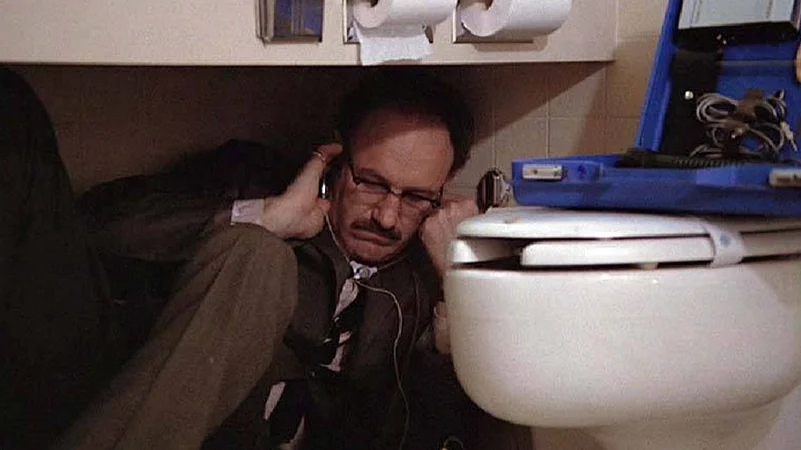Political scepticism has been a constant mention in a lot of Hollywood films. Beginning in the 1960s, the West has presented the US government and its intelligence establishment as dark and sinister on numerous occasions, with increasing audacity throughout the decades. Quite often critics have disregarded some of the finest paranoid thrillers and political conspiracy dramas of the last 60 years as fantasy genre in the works. Something that has been referred to as nothing more than popcorn entertainment.
However fictional the stories were, there was a grain picked up from reality. The demography’s distrust in the people of power that was derived from genuine scandals enveloping the United States in those decades, as well as allegations of the country’s government’s participation in killings and conflicts abroad – all of that, could never be completely ignored by the films of that time. Filmmakers did pick up on some of the greatest political conspiracy dramas and paranoid thrillers at that time, thanks to the then political scenario. Here are a few of them which have showcased this genre to the best:
‘The Manchurian Candidate’ (1962 and 2004)
The square-jawed military hero Raymond Shaw (played by actor Laurence Harvey) is indoctrinated to become a Soviet sleeper agent in filmmaker John Frankenheimer's 1962 film, which is a masterpiece of Cold War dread. The story's audacity stems from its open contempt for the stars-and-stripes pageantry of American politics, which can be readily used to serve the goals of Shaw's mother, Eleanor (Angela Lansbury), who desires just raw power. Similarly, filmmaker Jonathan Demme's enthralling 2004 remake, starring actor Denzel Washington as the guy investigating the scandal, shifted the focus from the Soviets to big business, with a multinational conglomerate this time arranging Shaw's ascent to power. The core lesson that Americans are readily fooled by the sight of military valour, has remained as salient, even four decades later.
‘The Conversation’ (1974)
The setup in filmmaker Francis Ford Coppola's this movie is claustrophobic and untidy. Harry Caul (played by actor Gene Hackman) runs a surveillance firm out of his fortified house in San Francisco, protected behind a triple-locked door and burglar alarm. Then he listens in on a discussion in which a couple talks about their dread of being murdered. Suspicious of the customers who hired him, Harry sinks deeper into suspicion and obsession, attempting to comprehend the actual meaning of what he's heard. Coppola's film, released the same year President Richard Nixon resigned over the Watergate recordings, is a well-polished picture of dread about the insidious expansion of surveillance by the government of the US.
‘The Parallax View’ (1974)
This is the second movie of filmmaker Alan J. Pakula's informal paranoia trilogy, which also includes 1971's ‘Klute’, about a missing-person’s case, and 1976's ‘All The President's Men’, about the Watergate crisis. ‘The Parallax View’ is the most outlandish and exciting of the three, yet it is based on the same dread that dominated American politics in the 1970s. It all starts with a dramatic killing of a presidential candidate atop Seattle's Space Needle; a congressional panel soon determines that the killer acted alone, but a journalist (played by actor Warren Beatty) uncovers the involvement of a strange business named Parallax. The wide-angle photography from cinematographer Gordon Willis, which provides incredible dread to the empty auditoriums and offices that Beatty runs around in, seeking to elude arrest as the nondescript operatives of Parallax shut in on him, is the best aspect of Pakula's film.
‘Marathon Man’ (1976)
Many of the heroes of 1970s political conspiracy thrillers are regular folks who have been pushed into realms they don't comprehend by sheer force of luck. Moving away from the cowboys, warriors, and cops of yesteryears, in this era, Hollywood resorted to journalists, nonconformists, and intellectuals like ‘Marathon Man’s hero, Babe Levy (played by actor Dustin Hoffman). As a history Ph.D. student, he becomes entangled in the case of a Nazi war criminal (played by Laurence Olivier) who is living in hiding and is supported by a secret government organisation. Filmmaker John Schlesinger's movie is a dramatic clash of performing styles, putting Hoffman, a New Hollywood hero, against Olivier, an old-fashioned theatrical classic. But it's also an honest and cruel piece, famous for a sequence in which Levy is tormented in a dentist's chair.
‘Blow Out’ (1981)
‘Blow Out’ is another great thriller centred on sound work. It is an even grimmer and more unnerving piece of paranoid storytelling. It stars actor John Travolta as Jack Terry, a movie sound-effects man who inadvertently films a political killing while performing his work. As he studies the damning background noise he picked up, Jack uncovers a conspiracy to assassinate a presidential candidate, and he methodically goes through each layer of audio to piece together the murder. Filmmaker Brian De Palma's primary concerns as a director have always been fixation and surveillance. He employs his camera as an active character and attempts to shock his viewers with unparalleled degrees of voyeurism. ‘Blow Out’ is the perfect storytelling fit for that approach, and it builds to a bleak finale that made the movie a box-office flop in 1981 but a cult classic ever since.
‘Absolute Power’ (1997)
The Vietnam War, the suppression of student uprisings, and scepticism of the intelligence community all contributed to disillusionment in the 1970s. However, throughout the 1990s, it was frequently focused on public morality and sex scandals, particularly those involving the then-president Bill Clinton and the White House. Actor-filmmaker Clint Eastwood's thriller features an all-star cast (actors Gene Hackman, Ed Harris, and Laura Linney) with a gruesome premise: A skilled thief (played by Clint Eastwood) steals into a mansion and inadvertently sees the president's (Hackman) murder of a lady with whom he is having an affair. Things go downhill from there, but it's all recounted with Eastwood's usual sobriety as he delves into a government that's rotting from the inside.
‘Enemy Of The State’ (1998)
‘Enemy Of The State’ mixes actor Will Smith, one of the iconic stars of '90s Hollywood, with actor Gene Hackman, who has been in a number of political conspiracy thrillers over the years. A government killing of a political candidate is recorded on surveillance, leading to a violent cover-up that puts do-gooder lawyer Robert Clayton Dean (Smith) in the sights, with government dissident Edward Lyle (Hackman) seeking to assist him. However, filmmaker Tony Scott transforms that story into an ear-splitting action spectacle, complete with gun fights, lens flares, and the frenzied graphics that have distinguished him as a moviemaker.



























